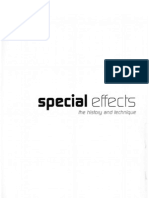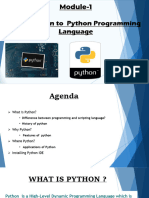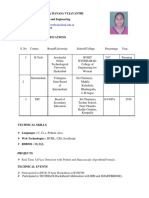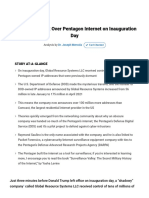0 ratings0% found this document useful (0 votes)
31 viewsPython
Python is a powerful yet easy to learn programming language. It has many features that make it versatile and enjoyable to code in, such as being free and open source, having an elegant syntax, strong support for object oriented programming, and large standard libraries. The document discusses 15 key features of Python including its dynamic typing, readability, portability across platforms, large community support, and use for both frontend and backend development.
Uploaded by
pyash2113Copyright
© © All Rights Reserved
We take content rights seriously. If you suspect this is your content, claim it here.
Available Formats
Download as PPTX, PDF, TXT or read online on Scribd
0 ratings0% found this document useful (0 votes)
31 viewsPython
Python is a powerful yet easy to learn programming language. It has many features that make it versatile and enjoyable to code in, such as being free and open source, having an elegant syntax, strong support for object oriented programming, and large standard libraries. The document discusses 15 key features of Python including its dynamic typing, readability, portability across platforms, large community support, and use for both frontend and backend development.
Uploaded by
pyash2113Copyright
© © All Rights Reserved
We take content rights seriously. If you suspect this is your content, claim it here.
Available Formats
Download as PPTX, PDF, TXT or read online on Scribd
You are on page 1/ 9
Python: Unleashing the
Magic - Exploring the
Enchanting Features of
a Programming
Language
Introductio
n
Welcome to a journey through
the enchanting features of
Python, a
programming language that will make you
fall in love with coding. Get ready to
explore the power of simplicity,
readability, and versatility that Python
offers. From its
elegant syntax to its vast library
ecosystem, Python is the perfect
language for
unleashing your creativity and making
magic happen in the world of
Python Features
Python is a dynamic, high-level,
free open source, and interpreted
programming language. It supports
object-oriented programming as
well as
procedural-oriented programming.
In Python, we don’t need to declare
the type of variable because it is a
dynamically typed language. For
example, x = 10 Here, x can be
anything such as String, int, etc.
Features in Python
There are many features in Python,
some of which are discussed below as
follows:
1. Free and Open Source
Python language is freely available at
the official website and you can
download it from the given download
link below click on the Download
Python keyword. Download Python
Since it is open-source, this means
that source code is also available to
the public. So you can download it,
use it as well as share it.
T he Pythonic
W ay
2. Easy to code
Python is a high-level programming language. Python is very easy
to learn the language as compared to other languages like C, C#,
Javascript, Java, etc. It is very easy to code in the Python
language and anybody can learn Python basics in a few hours or
days. It is also a developer-friendly language.
3. Easy to Read
As you will see, learning Python is quite simple. As was already
established, Python’s syntax is really straightforward. The code
block is defined by the indentations rather than by semicolons or
brackets.
4. Object-Oriented Language
One of the key features of Python is Object-Oriented programming
. Python supports object-oriented language and concepts of
classes, object encapsulation, etc.
Exploring Python's
Magic
5. GUI Programming Support
Graphical User interfaces can be made using a module such as PyQt5, PyQt4, wxPython,
or Tk in Python. PyQt5 is the most popular option for creating graphical apps with Python.
6. High-Level Language
Python is a high-level language. When we write programs in Python, we do not need to
remember the system architecture, nor do we need to manage the memory.
7. Large Community Support
Python has gained popularity over the years. Our questions are constantly answered by
the enormous StackOverflow community. These websites have already provided answers
to many questions about Python, so Python users can consult them as needed.
8. Easy to Debug
Excellent information for mistake tracing. You will be able to quickly identify and correct
the majority of your program’s issues once you understand how to interpret Python’s error
traces. Simply by glancing at the code, you can determine what it is designed to perform.
9. Python is a Portable language
Python language is also a portable language. For example, if we have Python code
for Windows and if we want to run this code on other platforms such as Linux, Unix,
and Mac then we do not need to change it, we can run this code on any platform.
10. Python is an Integrated language
Python is also an Integrated language because we can easily integrate Python with
other languages like C, C++, etc.
11. Interpreted Language:
Python is an Interpreted Language because Python code is executed line by line at
a time. like other languages C, C++, Java, etc. there is no need to compile Python
code this makes it easier to debug our code. The source code of Python is
converted into an immediate form called bytecode.
12. Large Standard Library
Python has a large standard library that provides a rich set of modules and
functions so you do not have to write your own code for every single thing. There
are many libraries present in Python such as regular expressions, unit-testing, web
browsers, etc.
13. Dynamically Typed Language
Python is a dynamically-typed language. That means the type (for example-
int, double, long, etc.) for a variable is decided at run time not in advance
because of this feature we don’t need to specify the type of variable.
14. Frontend and backend development
With a new project py script, you can run and write Python codes in HTML
with the help of some simple tags <py-script>, <py-env>, etc. This will help
you do frontend development work in Python like javascript. Backend is the
strong forte of Python it’s extensively used for this work cause of its
frameworks like Django and Flask.
15. Allocating Memory Dynamically
In Python, the variable data type does not need to be specified. The memory
is automatically allocated to a variable at runtime when it is given a value.
Developers do not need to write int y = 18 if the integer value 15 is set to y.
You may just type y=18.
T hanks!
You might also like
- Special Effects - The History and Techniques80% (5)Special Effects - The History and Techniques313 pages
- Learning Activity Sheet Science 10 Second Quarter - Week 788% (8)Learning Activity Sheet Science 10 Second Quarter - Week 74 pages
- Industrial Training Report (Harsh Raj Chouhan)No ratings yetIndustrial Training Report (Harsh Raj Chouhan)15 pages
- Python Programming Unit - I: History of PythonNo ratings yetPython Programming Unit - I: History of Python18 pages
- The Best Python Programming Step-By-Step Beginners Guide Easily Master Software engineering with Machine Learning, Data Structures, Syntax, Django Object-Oriented Programming, and AI applicationFrom EverandThe Best Python Programming Step-By-Step Beginners Guide Easily Master Software engineering with Machine Learning, Data Structures, Syntax, Django Object-Oriented Programming, and AI applicationNo ratings yet
- LEARN PYTHON PROGRAMMING: A Comprehensive Guide for Beginners to Master Python Programming (2024)From EverandLEARN PYTHON PROGRAMMING: A Comprehensive Guide for Beginners to Master Python Programming (2024)No ratings yet
- Module 1 Introduction To Python - AssignmentNo ratings yetModule 1 Introduction To Python - Assignment6 pages
- The forest was alive with the sound of rustling leaves and the occasional snap of a twig underfootNo ratings yetThe forest was alive with the sound of rustling leaves and the occasional snap of a twig underfoot3 pages
- 18wh1a0558@bvrithyderabad - Edu.in: Email-Id: Mobile No: +91-6303921228No ratings yet18wh1a0558@bvrithyderabad - Edu.in: Email-Id: Mobile No: +91-63039212282 pages
- Productivity Tools (Spreadsheet (Ms Excel) )No ratings yetProductivity Tools (Spreadsheet (Ms Excel) )90 pages
- Model: RV-25: Job Name: RV-25 Cut Sheet Tag: MK-1 Quantity: 1 Printed Date: October 7, 2021No ratings yetModel: RV-25: Job Name: RV-25 Cut Sheet Tag: MK-1 Quantity: 1 Printed Date: October 7, 20213 pages
- V & M Do BRASIL - Structural Tubes - VallourecNo ratings yetV & M Do BRASIL - Structural Tubes - Vallourec24 pages
- The Role of Artificial Intelligence in Modern HealthcareNo ratings yetThe Role of Artificial Intelligence in Modern Healthcare2 pages
- Abrasive Jet Machining (Ajm) : Dept. of ME, ACENo ratings yetAbrasive Jet Machining (Ajm) : Dept. of ME, ACE8 pages
- INF10003 Introduction To Business Information Systems: Mark Dale and Rohan Bennett February 2021No ratings yetINF10003 Introduction To Business Information Systems: Mark Dale and Rohan Bennett February 202134 pages
- DJI OM5 Mobile - Phone - Compatibility - List - ENNo ratings yetDJI OM5 Mobile - Phone - Compatibility - List - EN1 page
- Computer Fundamentals Objective Type Questions 1-25No ratings yetComputer Fundamentals Objective Type Questions 1-2520 pages
- Ururu Streamer Technology Air Purifier: MCK55WNo ratings yetUruru Streamer Technology Air Purifier: MCK55W2 pages
- Quantum Algorithms For Matrix Geometric Means: Nana Liu, Qisheng Wang, Mark M. Wilde, and Zhicheng ZhangNo ratings yetQuantum Algorithms For Matrix Geometric Means: Nana Liu, Qisheng Wang, Mark M. Wilde, and Zhicheng Zhang48 pages
- Digital Voltage Regulator: Installation and MaintenanceNo ratings yetDigital Voltage Regulator: Installation and Maintenance20 pages

























































































